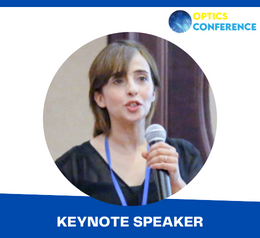Scholars 2nd Edition International Conference on
Optics, Lasers and Photonics
THEME: "A New Era towards Optics, Lasers & Photonics Technologies"
 27-28 Mar 2023
27-28 Mar 2023  Crowne Plaza Ealing, London, UK & Online
Crowne Plaza Ealing, London, UK & Online THEME: "A New Era towards Optics, Lasers & Photonics Technologies"
 27-28 Mar 2023
27-28 Mar 2023  Crowne Plaza Ealing, London, UK & Online
Crowne Plaza Ealing, London, UK & Online 
Bowling Green State University, United States
Title: Advanced thermoluminescence spectroscopy as a research tool for semiconductor and photonic materials
Farida Selim is a professor of Physics at
the department of Physics and the Center for Photochemical Sciences at BGSU.
She has a broad research program in the field of semiconductors and electronic
and photonic materials; and has been active in constructing beam lines and developing
new instrumentation for advanced material research. She authored 135 peer
review journal articles, published two books, and numerous patents. She is on
the advisory boards of six international scientific committees related to
positron annihilation spectroscopy, oxide semiconductors, photonic materials,
and radiation. She plays a leading role in national research projects including
two new Energy Frontier Research Centers (EFRC) from Department of Energy
Thermo-luminescence (TL) or thermally
stimulated photoemission spectroscopy is based on liberating charge carriers
from traps in the band gap by providing enough thermal energy to overcome the
potential barrier of the traps. It provides a powerful tool to measure the
positions of the localised states/traps in the band gap. Despite that, its
applications in semiconductors have been very limited.
Here we describe the development
of cryogenic thermally stimulated photoemission spectroscopy (C-TSPS) for the low
temperature regime from 9 K to room temperature to extend TL measurements to cover the entire range of
shallow and deep levels in band gap materials
and show how it can be used for the characterisation of deep and shallow
donors and acceptors in semiconductors. Examples of its applications in
measuring/donor ionisation enegies in Ga2O3 and ZnO films
and bulk crystals are demonstrated.
This newly developed spectrometer provides a
powerful characterisation tool for a wide range of semiconductors and
electronic and photonic materials. It can be used to measure the electrical
transport properties of semiconductors and study exciton dynamics in photonic
materials and reveal their interesting characteristics. It will advance
material characterisation and development for a wide range of applications
including lasers, electronic and illumination devices, and detectors for
medical diagnostic and nuclear applications.